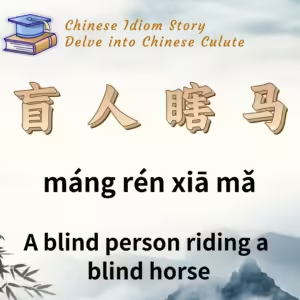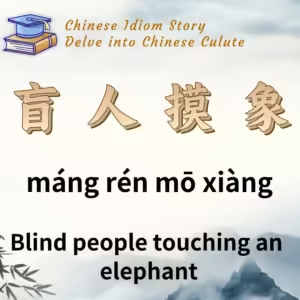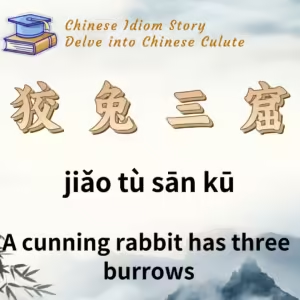
Chinese Idiom: 盲人瞎马 (Mang Ren Xia Ma)
English Translation: A blind person riding a blind horse
pīn yīn: máng rén xiā mǎ
Idiom Meaning: To act recklessly and blindly, resulting in a very dangerous situation.
Historical Source: From Shishuo Xinyu (《世说新语》) by Liu Yiqing of the Southern Dynasty.
Idiom Story:
The idiom “盲人瞎马” originates from a story involving the Eastern Jin painter Gu Kaizhi, the politician Huan Xuan, and the governor of Jingzhou, Yin Zhongkan. One day, the three friends gathered for drinks and engaged in a conversation about the most dangerous situations.
Huan Xuan initiated the exchange with his poetic line: “Using a spear tip to wash rice” (矛头淅米剑为炊), highlighting the inherent danger in such reckless behavior. Yin Zhongkan followed with “An old man of a hundred climbing a withered branch” (百岁老翁攀枯枝), which he deemed even more perilous.
Gu Kaizhi then contributed, “A baby lying on the yoke over a well” (井上辘轭卧婴儿), which impressed both Huan Xuan and Yin Zhongkan, as it vividly depicted a grave danger.
At that moment, a military officer serving under Yin Zhongkan chimed in with, “A blind person riding a blind horse, near a deep pool at midnight” (盲人骑瞎马,夜半临深池). This line alarmed Yin Zhongkan so much that he nearly leaped from his seat, recognizing the extreme danger of such a scenario.
Huan Xuan and Gu Kaizhi couldn’t help but laugh, as they realized that Yin Zhongkan had already lost sight in one eye, making the phrase particularly resonant for him.
This story illustrates the profound dangers of blind recklessness and has led to the idiom being used to describe situations that are perilous due to a lack of awareness or foresight. It serves as a warning against hasty actions that can lead to disastrous consequences.






